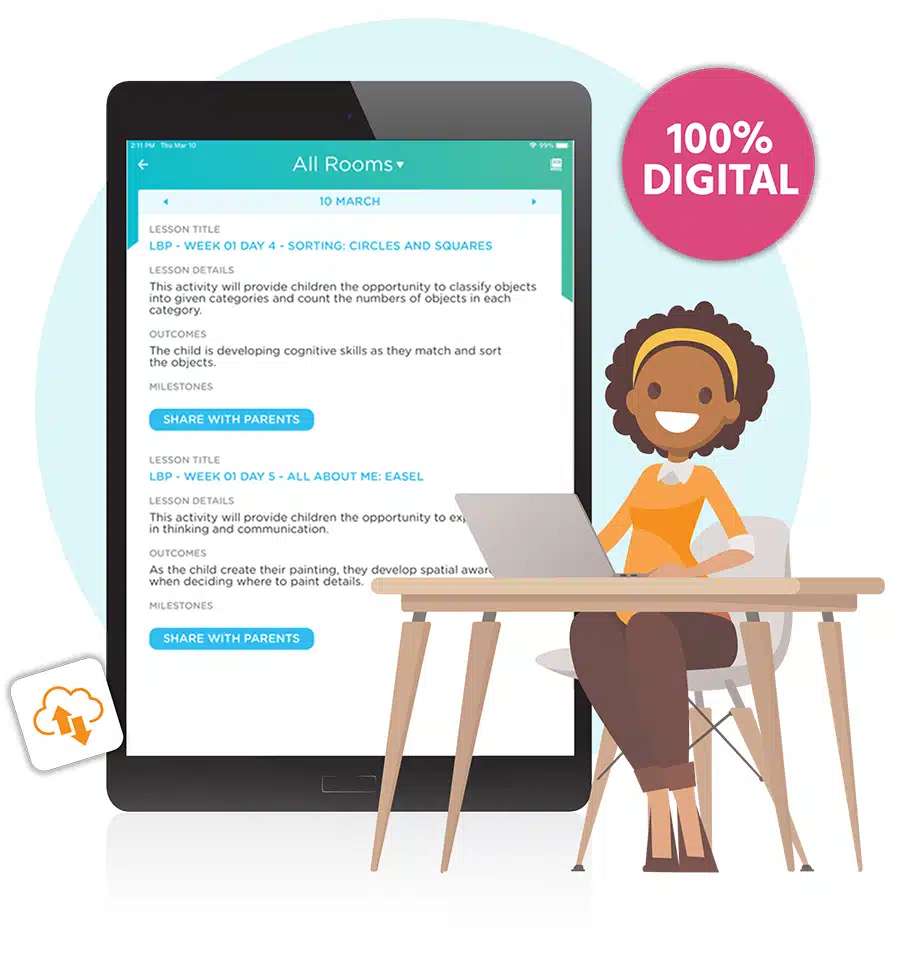
This blog was originally posted on January 10, 2022, and was updated on February 21, 2024, with new information.
The 2024 Child Care Management Software Industry Trends Report from Procare Solutions found that 30% of early childhood education programs need more professional development for teachers and staff.
Professional development in your child care center is vital to retaining staff. Employee retention rates rise by 30-50% when companies prioritize staff learning. This is important information because employee turnover is super expensive, and there are steps you can take to make professional development fun and educational!
How do you make sure your child care business prioritizes staff learning? There are plenty of ways, one of which is to host a professional development day for your team.
Let’s take a look at what professional development days are and how to ensure your daycare staff learns what they need to while having a ton of fun!
What is a Professional Development Day?
In the child care industry, professional development days are a time for teachers, directors and other daycare workers to gather together and learn new skills.
These gatherings often feature guest lecturers, structured curriculum and/or fun team building activities. The only thing that must happen during your daycare’s professional development day is the further development of your staff.
Make it a way for employees to be exposed to new ideas, learn new skills and connect with their colleagues.
Host Better Professional Development Days With These 5 Tips
How do you host a professional development day that actually helps your staff learn new skills? The best professional development days are educational and fun.
1. Create an Agenda
First things first, create an agenda for your professional development day. Doing so has a couple of advantages. One, it will help keep you and your team on track. And two, it will help your staff understand what to expect.
Let’s take a closer look at each of these benefits.
- Stay On Track: Professional development days should be fun. That said, nobody wants their development days to stretch on too long. An agenda will ensure sessions end when they’re supposed to and your staff gets an appropriate amount of breaks.
- Inform Your Staff: An agenda will also give your team an idea of what to expect, especially if you’ve never hosted a professional development day before. When your staff knows what to expect, they can relax more because they won’t have to wonder what’s next.
Here’s an example of a professional development day agenda:
| Time | Activity |
| 8 a.m. | Icebreaker Game |
| 8:30 a.m | Guest Lecturer #1 |
| 9:30 a.m | 15 Minute Break |
| 9:45 a.m | Team Building Activity #1 |
| 10:45 a.m | Guest Lecturer #2 |
| 11:45 a.m | Lunch Break |
| 12:30 p.m. | Team Building Activity #2 |
| 1:30 p.m. | Team Discussion Time |
| 2 p.m. | End of Professional Development Day |
Does your professional development day have to look exactly like this? Of course not! This is just an idea. Schedule your own development days as you see fit.
2. Schedule Short Sessions
Take another look at the professional development day agenda above. What do you notice about it? Hopefully, you noticed that none of the sessions stretch longer than one hour.
This is key! The longer your sessions go, the more likely it is that your staff will get bored and tune out. When this happens, learning comes to a screeching halt and the benefits of hosting a professional development day go right out the window.
Your professional development days, as a whole, should be on the shorter side for the same reasons described above. The longer they go, the harder it will be to engage your staff.
Free Template
Child Care Staff Evaluation & Assessment
This free template helps ensure you cover all your bases when you review your child care staff’s performance.
3. Focus on Active Learning
“Active learning is learner-centered and passive learning is teacher centered. Active learning requires students to think, discuss, challenge and analyze information. Passive learning requires learners to absorb, assimilate, consider and translate information. Active learning encourages conversation and debate, while passive learning encourages active listening and paying attention to detail,” according to the K-12 Teachers Alliance.
Active learning is typically best for professional development days.
Why is this so? Because active learning is hands on and will encourage your staff to ask questions, give feedback and otherwise engage with the educational material you have planned. It’s also a much more fun way to learn during development days.
So how do you focus on active learning? Here are a few ideas:
- Ask your staff questions during training sessions. If you’ve hired a guest lecturer to speak, ask them to do the same. This will naturally engage your employees.
- Plan small group activities that help reinforce the lessons your staff has learned. For example, if your team attends a lesson-planning session, split them into groups right after and ask them to plan next week’s lesson using their new skills.
- Plan time during your professional development day for a team-wide discussion. That way your staff can voice their opinions, ask questions and contribute ideas. Doing so will allow them to become active participants during development days.
4. Prioritize Team Building

It’s important for your employees to learn about the latest child care techniques and strategies. But they also need to learn how to work together. We suggest planning multiple team building exercises throughout your professional development day.
For example, you could:
- Play Two Truths and a Lie: Gather your staff into a circle. Then ask each person to make three statements about themselves. Two of the statements must be truthful, the third must be a lie. The rest of your staff will then guess which statements are true and which are lies. Go around the circle until everyone has had a turn.
- Test Your Staff’s Knowledge of Their Colleagues: There are plenty of ways to do this. One of our favorites is to ask your team to line up in order of their birthday month, all without talking to each other. This game is simple and super fun!
- Ask Your Team to Share Something Personal: Personal stories bind people together. So why not ask your team to share a quick story about their favorite family vacation? Or why they decided to become a professional child care provider? Or who their favorite historical figure is and why? The options are endless.
Team building activities will teach your team how to be a team! They’re also incredibly fun to play, which will help boost enjoyment levels during your development days.
5. Set Follow-Up Goals
End your professional development days with follow-up goals. What things do you want your staff to work on over the next couple of months? The goals you set are completely up to you. Just make sure they’re SMART, which stands for:.
- Specific: The best goals are specific. What exactly do you want your team to do and/or achieve after hosting a professional development day?
- Measurable: Your goals should also be measurable. Saying, “I want to implement XYZ child care techniques this month,” is better than saying, “I want to become a better daycare teacher before our next professional development day.”
- Attainable: Can your staff actually achieve the goals you set? If not, set new objectives. Unattainable goals will only serve to demoralize your staff.
- Relevant: The goals you set during your professional development day should be relevant to your business. Personal goals should be addressed on personal time.
- Time-Based: Finally, make sure your goals are time-based with a deadline. Say something like, “We want to achieve/implement/do XYZ by a specific date.”
How to Ensure Great Professional Development Days!

If you’re planning to host a professional development day for your daycare staff, you need to make sure the experience is both educational and fun.
When your employees have the right tools, they can serve your customers better. They’ll also be more productive and have fewer daily frustrations to deal with. These things will improve their general moods and help make your child care center a more enjoyable place to work.
A strong digital curriculum that’s easy to use supports your teachers and can ease some of the stress they encounter each day.
Procare Early Learning powered by Learning Beyond Paper is an all-digital curriculum specifically designed to meet the unique needs of educating children from infancy through pre-kindergarten.
It embeds Learning Beyond Paper’s early childhood curriculum, which was designed by educators with decades of combined experience, into the Procare platform, making it easier and less time-consuming for busy teachers and administrators to provide high-quality education.
Training for teachers is built into daily instruction plans with real-time tips, tools and strategies for all team members.
In addition to curriculum training, Procare Early Learning users can take advantage of richer professional development opportunities and earn continuing education units at no extra cost through a partnership between Learning Beyond Paper and Bertelsen Education.
How much time and money could your childcare center save using a digital curriculum designed for young learners? Enter your number of staff, number of students and type of program into our online calculator to see your potential time and money savings!


